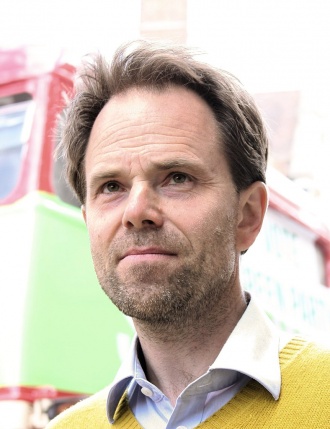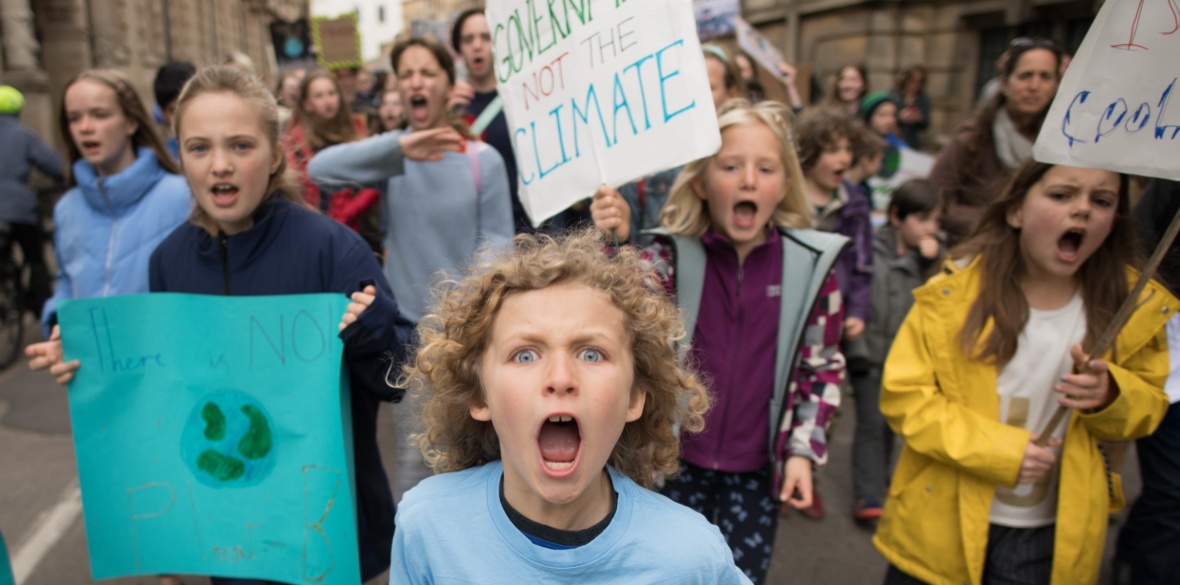This is the last article you can read this month
You can read more article this month
You can read more articles this month
Sorry your limit is up for this month
Reset on:
Please help support the Morning Star by subscribing here
THE past year has been the busiest and most exciting of his life, Rupert Read tells me when we meet in London before his appearance at a Guardian event on Extinction Rebellion.

Last summer Read, a reader in philosophy at the University of East Anglia (UEA) and senior Green Party figure, refused an invitation from the BBC to debate a climate change denier.
He went on to lead a short campaign which culminated in a BBC memo warning staff of “false balance” when reporting climate change.
“To achieve impartiality, you do not need to include outright deniers of climate change in BBC coverage, in the same way you would not have someone denying that Manchester United won 2-0 last Saturday,” wrote Fran Unsworth, the BBC’s director of news and current affairs.
For the past few years Read, 53, has also been giving lectures, speaking with a refreshing — perhaps shocking — honesty about the climate crisis.
“I think there is a very real possibility that the latter part of the lives of most people in this room is going to be grim or non-existent,” Read told first-year students arriving at the UEA in 2016 to nervous laughter.
“When I started giving these talks … I was worried I would just demoralise people and turn people off,” Read tells me.
“I was worried I would be attacked for being a defeatist. But actually that didn’t happen. From the beginning the overwhelming response has been positive. People found it liberating, people have found it exciting, people have really related to the honesty of it.”
After watching a similar lecture online given by Gail Bradbrook, one of the co-founders of Extinction Rebellion, Read quickly became involved in the grassroots organisation.
What has become known as XR has three demands: the government must tell the truth by declaring a climate and ecological emergency; the government must reduce greenhouse gas emissions to net zero by 2025; and a citizen’s assembly must be established to lead the government’s response to climate breakdown.
On October 31 2018 Read acted at the co-MC for the initial “Declaration of Rebellion” event in London, when a street was blocked in Parliament Square in London.
“We didn’t really know if it was going to work, we didn’t know whether people were going to do it, we didn’t know how the police would react,” he says.
“It was surprisingly easy, which is one of the things that is very interesting about large-scale non-violent direct action. When you get a lot of people together it’s quite challenging for the police to deal with and stop.”
He also played a key role in the November 2018 “bridges action,” when thousands of Extinction Rebellion supporters managed to block and hold five bridges in central London for one day.
It was, Read explains, “proof of concept,” its success leading onto what he calls the “international rebellion” in April 2019.
By now Read was part of Extinction Rebellion’s political strategy group and acting as one of the main spokespeople in the media.
During this action Extinction Rebellion occupied several key sites in central London — Oxford Circus, Marble Arch, Waterloo Bridge and Parliament Square — for an incredible 11 days. Over 1,100 people were eventually arrested.
“In the first few days the media were very, very hostile to us,” Read notes. “Then as we went on and we gradually grew and attracted more of people’s sympathy and support because of our persistence, because the message started to get through, that gradually changed.
“And then in the second week we were getting these massive transformational effects.” For example, writing in the Daily Telegraph, former Tory leader William Hague argued: “It is time to recognise that these young activists are indeed focused on the right issue.
“The solutions presented by protesters in London or by Green parties around the world may be ill thought-out, but the analysis is now hard to gainsay.”
More broadly, Read argues the April action achieved “a breakthrough in consciousness” on the climate crisis, with a YouGov survey earlier this month finding “the public is more concerned about the environment than ever before.”
This upsurge in anxiety was “undoubtedly boosted by the publicity raised for the environmental cause by Extinction Rebellion,” the pollster noted.
“The ground had been, in a sense, prepared,” Read says, highlighting the importance of the School Strikes for Climate and David Attenborough’s BBC documentary Climate Change — The Facts, which aired during the rebellion.
“We achieved emotional resonance,” he continues. “A lot of our successful media coverage is, I think, based on the fact that we have allowed us to show and express our grief and our horror, and our fear, and our love in ways that were very unusual hitherto in the so-called environmental movement.”
Indeed, while others, such as Peace News, have been critical of what they describe as the group’s “apocalyptic organising,” Read argues the success of the April rebellion “has proved that it is false to claim apocalyptic messages and despair and climate honesty are demotivating.
“In fact it is becoming clear they are hugely motivating, and hugely empowering, when they are done right, and when they are done honestly and when they are done in the context of taking action around them.”
Perhaps most impressively, the April protests led to Read and others, including student climate strikers, meeting Environment Secretary Michael Gove and other senior political figures including shadow chancellor John McDonnell.
“That was all prepared way in advance,” he explains. “There were plans for how this would happen, who would do it, what kind of things we would do when we did it, who would we try to target for such meetings.
“We urged him to tell the truth, we urged the declaration of a climate emergency,” Read says about the meeting with Gove, which was filmed and is available online.
Gove didn’t do this, but he did admit there was an emergency in Parliament and the Tories didn’t oppose the Labour motion to declare an emergency, meaning the House of Commons became the first national parliament to officially declare a climate emergency on May 1 2019.
A few days after the interview Theresa May’s government accepted the committee on climate change’s recommendation that Britain achieve net zero carbon emissions by 2050.
Read believes the difference between the 2050 target and Extinction Rebellion’s 2025 target is “probably the difference between a chance of a decent future and a near certainty of civilisational collapse.”
“Unfortunately the climate change committee report is essentially dead on arrival,” he says. Why? “It’s a report that is tailored to a sense of what is politically feasible and societally acceptable that no longer exists and has been transcended.
“Between the time of them drafting their report and it actually being published — it was published immediately after the end of the [April] rebellion — that whole landscape has been transformed.”
Looking to the future, Read notes the group is planning for the next stage of the Rebellion, likely to take place around September 20 2019 — the date student climate strikers have asked adults to strike alongside them.
This mobilisation “will probably mark the first step in the build-up to the autumn phase of Extinction Rebellion, which we intend to be longer and deeper than the spring phase.”
With the Metropolitan Police Commissioner recently telling London Assembly members her force would learn from the April protests, how do Extinction Rebellion intend to deal with the police?
“The aim of many Extinction Rebellion actions is to create what we call action dilemmas — action dilemmas for the police, for the authorities,” Read replies.
This staple of non-violent struggle is about forcing a “lose-lose” situation upon public authorities, in which they either concede the space and initiative to the protesters or risk looking repressive if they try to deal with them too harshly.
“They are going to risk creating more sympathy for us if they end up locking people up who are clearly decent non-violent people who are doing this knowingly and accountably for a cause that more and more people recognise as just,” Read says.
Hopeful the group can attract significantly more people than it did in April, Read thinks the size and impact of the autumn mobilisation could be unprecedented: “If we could get 20,000 or 30,000 people willing to take direct action on the streets in a concerted fashion for a long period of time, who knows what we could achieve next time?”
Co-authored with Samuel Alexander, Rupert Read’s new book This Civilisation is Finished: Conversations on the End of Empire — and What Lies Beyond is published by the Simplicity Institute.










